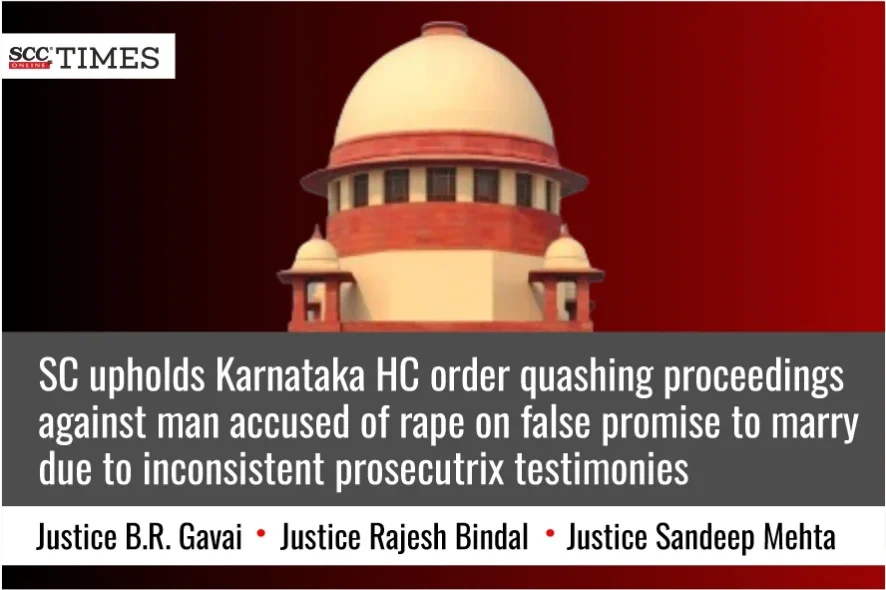Supreme Court: In a criminal appeal filed against the order passed by the Karnataka High Court, wherein the Court allowed the petition filed under Section 482 of the Criminal Procedure Code, 1973 (‘CrPC’) preferred by the accused persons and quashed the entire proceedings pending against them before the Additional District and Sessions Judge, the three-judge bench of BR Gavai*, Rajesh Bindal and Sandeep Mehta , JJ. while upholding the impugned order, said that there are no sufficient grounds for proceeding against the accused, and no error has been committed by the High Court by holding that permitting further proceedings to continue would be an abuse of process of law and result in miscarriage of justice.
Background:
In 2016, while the appellant (complainant) was still a minor, accused after becoming acquainted with her while they both were preparing for the competitive examination, made her fall in love with him. He took her to his aunty’s house whereupon he had sexual intercourse with her, after leading her to believe that he would marry her. A few days thereafter, the accused took the appellant to his house to introduce her to his parents. In his family’s absence, the accused forcibly engaged in sexual intercourse with her. As a consequence, she got pregnant. Six months into the pregnancy, upon gaining knowledge of the same, the accused and his brother forcibly took her to a nursing home and compelled her to undergo an abortion.
Subsequently, the accused reiterated his promise to marry her, however, he stated that such marriage would take place only after he finished his preparation for the Karnataka Administrative Service Examination. He further compelled her to maintain silence by threatening her that if she discloses any information about the termination of her pregnancy to her parents, he will kill her and will also kill himself by consuming poison. The parents of the accused also assured the appellant that she and accused would get married after the latter finished with his studies.
Thereafter, the parents of the appellants visited the house of the accused with the request for the marriage of the appellant and the accused. However, the accused persons turned down the request and asserted that no such marriage would be possible since the appellant was a prostitute belonging to the Scheduled Caste.
The appellant then lodged a FIR against the accused persons. After the conclusion of the investigation, a charge-sheet came to be filed against all the accused persons for the offences punishable under Sections 354-D, 376(2)(n), 504 and 506 read with 34 of the Penal Code, 1860 (‘IPC’) and Sections 3(1)(r), 3(1)(s), 3(1)(w)(i), 3(2)(v) and 3(2)(v-a) of The Scheduled Castes and Scheduled Tribes (Prevention of Atrocities) Act, 1989 (‘SC/ST Act’). Being aggrieved thereby, the accused persons preferred a petition under Section 482 of CrPC before the High Court, praying for quashing of the proceedings pending before the trial court. Thereafter, the High Court allowed the petition and quashed the aforestated proceedings in respect of all the accused persons. Aggrieved thereby, the present appeal has been filed by the appellant.
Analysis:
The Court noted that as per Karnataka Secondary Education Examination Board Certificate, the appellant’s date of birth is 12-09-1998, and said that even if it is assumed that the incident has taken place in January 2019, she would have been over the age of 18.
Further, the Bench noted that the initial version of the complainant is that after she became pregnant, she was taken to the Nursing Home wherein she was compelled to undergo abortion. However, the statement of the doctor/Head of Nursing Home would show that the complainant’s version that she was brought to the Nursing Home on 17-08-2020 to abort her six-month pregnancy was false. Further, in her restatement, she changed her version and stated that she was not taken to the Nursing Home and administered some medicine which was not allopathy which led to her pregnancy’s termination.
After taking note of Pramod Suryabhan Pawar v. State of Maharashtra, (2019) 9 SCC 608, said that the allegations in the FIR and also in the restatement do not, prima facie, indicate that the promise by accused was false or that the complainant engaged in the sexual relationship based on such false promise. This is apart from the fact that the prosecutrix has changed her version. The version of events given by the prosecutrix in the restatement is totally contrary to the one given in the FIR.
Further, taking note of the guidelines relating to the exercise of the extraordinary power under Article 226 of the Constitution or the inherent powers under Section 482 of CrPC, given in State of Haryana v. Bhajan Lal, 1992 Supp (1) SCC 335 the Court said that even if the allegations made in the FIR and the material on which the prosecution relies, are taken at its face value, there are no sufficient grounds for proceeding against the accused. The High Court has correctly applied the law on the issue and come to a just finding warranting no interference.
[X v. A, 2024 SCC OnLine SC 316, decided on 18-03-2024]
*Judgment Authored by: Justice BR Gavai
Justice B.R. Gavai nominated for the post of Chairman of Supreme Court Legal Services Committee
Advocates who appeared in this case :
For Petitioner(s): Sabarish Subramanian, AOR, Naman Dwivedi, Adv, Vishnu Unnikrishnan, Adv., C Kranthi Kumar, Adv, Danish Saifi, Adv.
For Respondent(s): M Yogesh Kanna, Adv., Raghunatha Sethupathy B, AOR, S. Sabari Bala Pandian, Adv., Vasu Kalra, Adv., Monica Saini, Adv.









